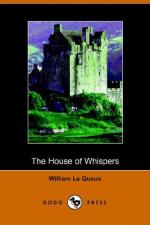“If Stewart or any of the under-keepers had found you prowling about the Castle grounds at that hour they might have asked you awkward questions,” remarked Flockart.
“Oh,” laughed the other, “they all know me as a visitor to the village fond of walking exercise. I took very good care that they should all know me, so that as few explanations as possible would be necessary. As you well know, the secret of all my successes is that I never leave anything to chance.”
“To go peeping about outside the house and trying to took in at lighted windows sounds a rather injudicious proceeding,” his companion declared.
“Not if proper precautions are taken, as I took them. I was weeks in that terribly dull Scotch village, but nobody suspected my real mission. I made quite a large circle of friends at the ‘Star,’ who all believed me to be a foreign ornithologist writing a book upon the birds of Scotland. Trust me to tell people a good story.”
“Well,” exclaimed Flockart, after a long silence, “those Whispers are certainly a mystery, more especially if you’ve actually heard them. On two or three occasions I’ve spoken to Sir Henry about them. He ridicules the idea, yet he admitted to me one evening that the voices had really been heard. I declared that the most remarkable fact was the sudden death of each person who had listened and heard them. It is a curious phenomenon, which certainly should be investigated.”
“The inference is that I, having listened to the ghostly voices, am doomed to a sudden and violent end,” remarked the shabby stranger quite gloomily.
Flockart laughed. “Really, Felix, this is too funny!” he said. “Fancy your taking notice of such old wives’ fables! Why, my dear fellow, you’ve got many years of constant activity before you yet. You must return to Paris in the morning, and watch in patience.”
“I have watched, but discovered nothing.”
“Perhaps I’ll come and assist you; most probably I shall.”
“No, don’t! As soon as you leave San Remo Sir Henry will know, and he might suspect.”
“Suspect what?”
“That you are in search of the truth, and of fortune in consequence.”
“He believes in me. Only the other day I had a letter from him written in Goslin’s hand, repeating the confidence he reposes in me.”
“Exactly. You must remain down here for the present.”
Flockart recollected the puzzling decision of Lady Heyburn, and remained silent.
“Our chief peril is still the one which has faced us all along,” went on the man in the grey hat—“the peril that the girl may tell about that awkward affair at Chantilly.”
“She dare not,” Flockart assured him quickly.
Krail shook his head dubiously. “She’s leading a lonely life. Her heart is broken, and she believes herself, as every other young girl does, to be without a future. Therefore, she’s brooding over it. One never knows in such cases when a girl may fling all prudence to the winds,” he said. “If she did, then nothing could save us.”




